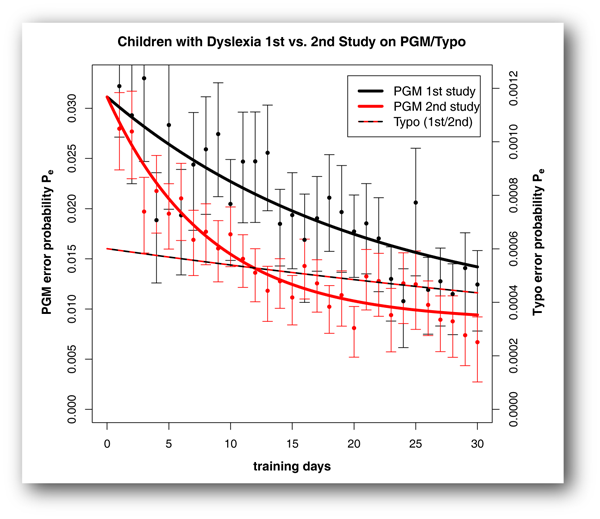Computer-based learning of spelling skills in children with and without dyslexia
M. Kast, G.M. Baschera, M. Gross, L. Jaencke, M. MeyerAnnals of Dyslexia, Springer Verlag, pp. 1-24
Abstract
Our spelling training software recodes words into multisensory representations comprising visual and auditory codes. These codes represent information about letters and syllables of a word. An enhanced version, developed for this study, contains an additional phonological code and an improved word selection controller relying on a phoneme-based student model. We investigated the spelling behavior of children by means of learning curves based on log-file data of the previous and the enhanced software version. First, we compared the learning progress of children with dyslexia working either with the previous software (n=28) or the adapted version (n=37). Second, we investigated the spelling behavior of children with dyslexia (n=37) and matched children without dyslexia (n=25). To gain deeper insight into which factors are relevant for acquiring spelling skills, we analyzed the influence of cognitive abilities, such as attention functions and verbal memory skills, on the learning behavior. All investigations of the learning process are based on learning curve analyses of the collected log-file data. The results evidenced that those children with dyslexia benefit significantly from the additional phonological cue and the corresponding phoneme-based student model. Actually, children with dyslexia improve their spelling skills to the same extent as children without dyslexia and were able to memorize phoneme to grapheme correspondence when given the correct support and adequate training. In addition, children with low attention functions benefit from the structured learning environment. Generally, our data showed that memory sources are supportive cognitive functions for acquiring spelling skills and for using the information cues of a multi-modal learning environment.Overview
In this publication we present the investigation of the spelling progress of children working with Dybuster. We analyze the spelling behavior by means of learning curves based on the collected log file data of the two user studies. First, we compare the learning progress from the first and the second study. This allows for an evaluation of the phoneme-based enhancements, consisting of a new phonological code and an adaptive word selection controller, implemented in the learning software. We expect the dyslexic children who work with the enhanced software version to improve their spelling behavior significantly faster than dyslexic individuals who work with the original version. Second, based on data collected in our second study, we investigate the influence of different cognitive factors on the learning progress. These factors include: the indication of dyslexia, attention functions, and memory performances. Comparing children with and without dyslexia allows us to explore whether both groups benefit to the same extent from the training or if children with dyslexia, irrespective of the method used, generally experience more problems acquiring spelling knowledge. We decided to evaluate attention and memory functions because, on the one hand, it has been suggested that reading problems are associated with impaired memory functions, which in turn cause reduced phonological representations. On the other hand, attention functions build the general basis for learning, since attention processes control all functions of our cognitive system, provided that tasks are not over-learned and automated. Attention helps people focus on the relevant information. Therefore, we aim to examine the influence of memory and attention functions on the spelling progress acquired in a structured environment.
Results
Our results demonstrate that the phoneme-based enhancements implemented in the Dybuster spelling software positively influence the spelling performance of dyslexic children. The participants working with the studentadaptive software version show a significantly increased learning progress. Additionally, there is evidence that both children with and without dyslexia profit from the computer-based training in a similar way. Both groups were able to use the visual and auditory coding system implemented in the learning software to acquire spelling skills and facilitate the memorization of phonological information. Children with low (vs. high) attentional performances could benefit equally from the structured computer-based learning software. This finding implicates that children with low attention resources need clear guidance and may benefit from a structured methodological approach. Moreover, we were able to show that memory functions correlate positively with learning progress irrespective of dyslexia. This indicates that memory functions are important cognitive sources for acquiring spelling skills.


